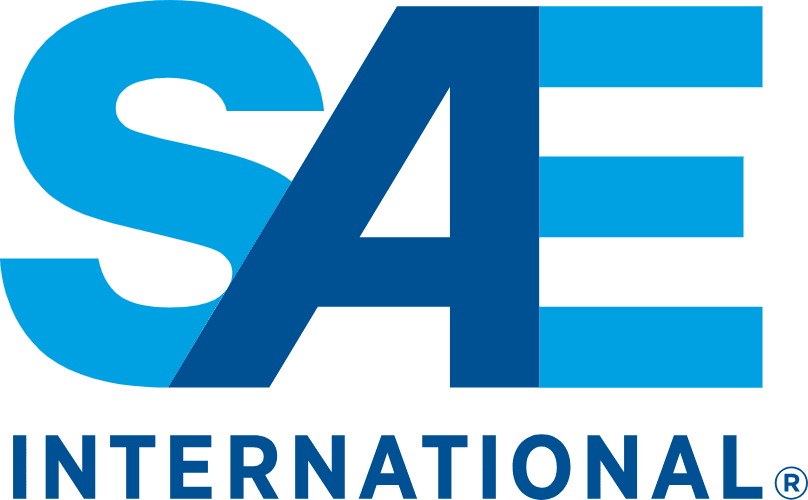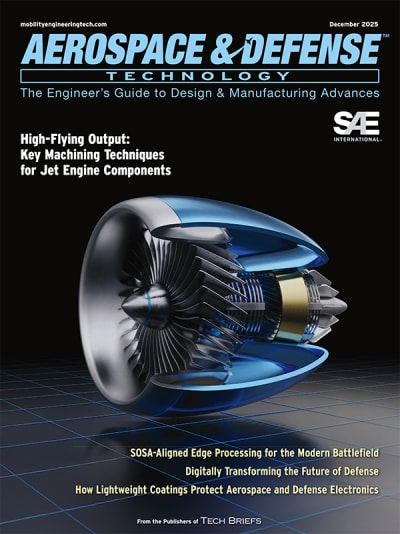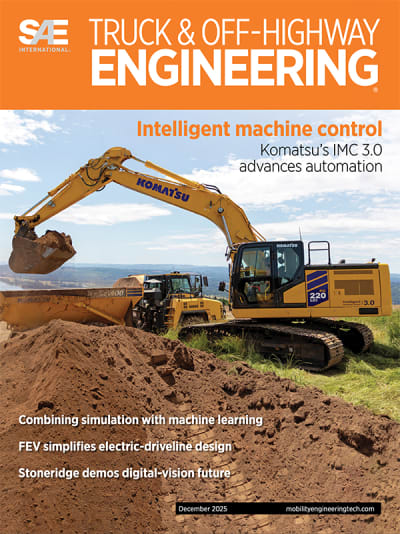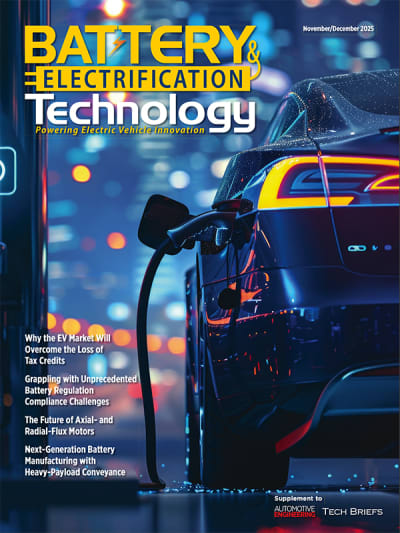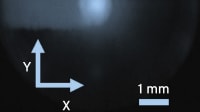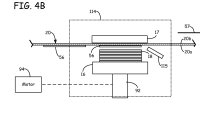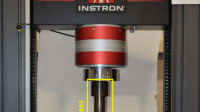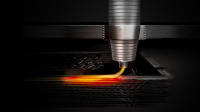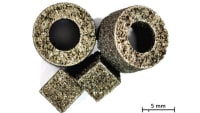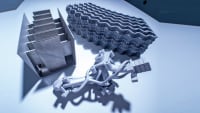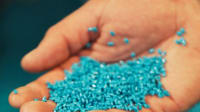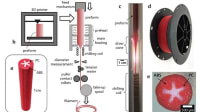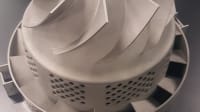Aitiip Integrates Freeform Injection Molding to Lower Weight and Reduce Production Costs

Aitiip is a leading Spanish research and development institute and serves companies in the aeronautics, automation, industrial, and packaging sectors. The institute possesses strong platforms for the characterization of materials and processes and is known as a powerful integrator of technologies, which is constantly on the lookout for the next transformative technology. A year ago, Aitiip implemented an NXE 400 industrial resin 3D printer platform from Nexa3D to explore integrations of additive manufacturing and injection molding. Nexa3D is the Ventura, California-based provider of high-speed industrial printing technologies whose portfolio continues to grow, reflected in its acquisition of Essentium, one of the world’s most well-known providers of extrusion 3D printing, earlier this year.
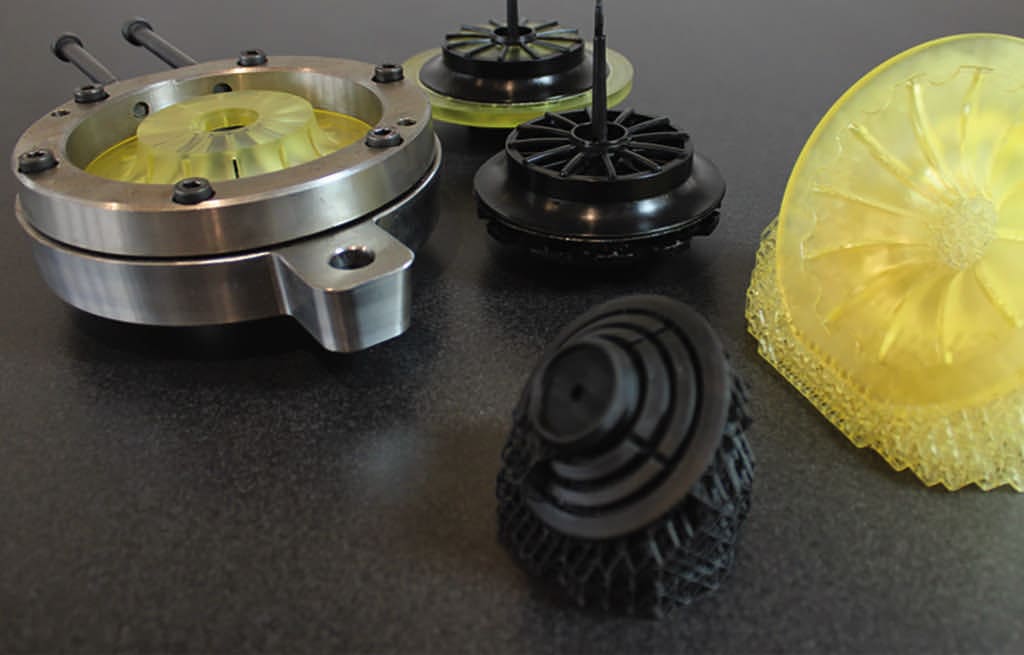
Liebherr is one of the world’s largest providers of a variety of industrial goods, services and products. Aerospace and transportation systems is one of 13 different product segments supplied by the multinational Liebherr Group. Liebherr-Aerospace & Transportation, based in Toulouse, France, produces a wide variety of systems and components for the aerospace industry across five global locations. The aerospace product segment develops and manufactures flight control and actuation systems, gearboxes and travel mechanisms, air management and cooling systems, as well as electronics among other systems and components.
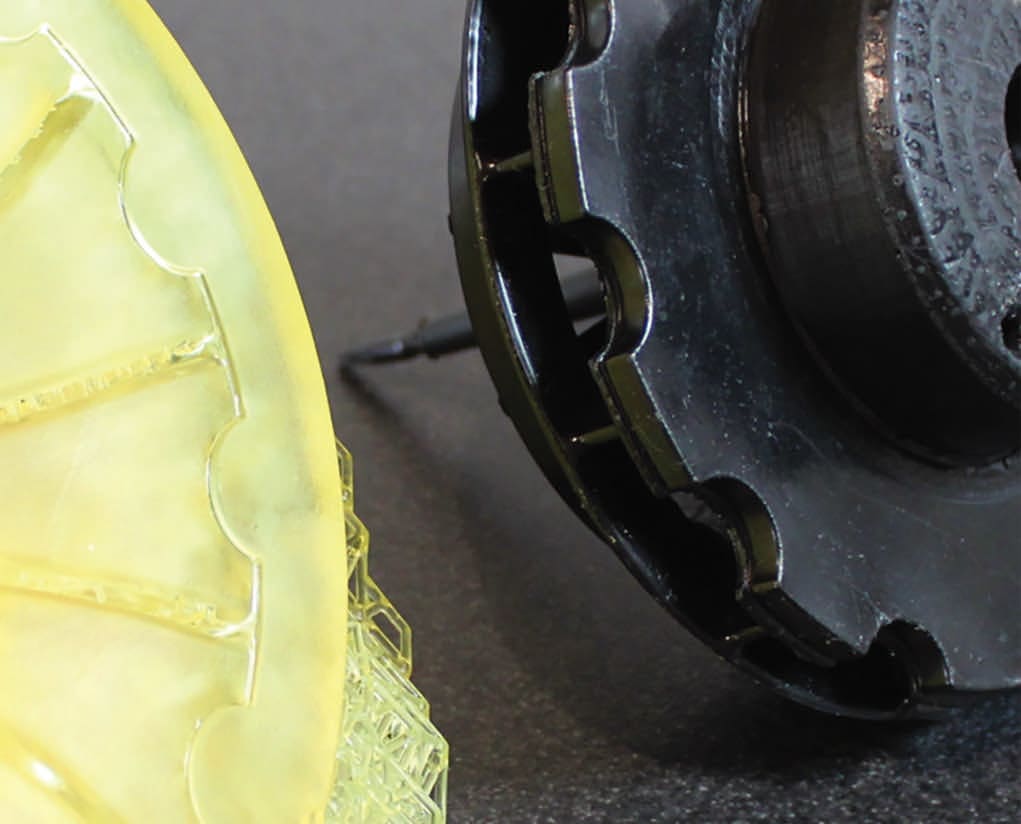

The aerospace division of Liebherr collaborated with Aitiip to meet the goal of replacing a metal flange wheel with a flange wheel made in recycled injection-molded high-performance polymer. The ambition is to develop a technology that allows the manufacture of flange wheels for the cooling systems of aeronautics platforms with 100 percent recyclable materials.
Recognizing that the performance of the chosen polymers would be critical to quality, and that some part features would be more cost-effective to realize with additive manufacturing, Aitiip turned to the NXE 400 and Freeform Injection Molding (FIM) to meet customer expectations. FIM is a platform developed by the Danish company Addifab. Put simply, FIM speeds up injection molding by 3D printing the molds into which the materials are injected. Why do this if additive manufacturing by itself can be so fast? The fact remains that injection molding is a very speedy technology – and an effective one, especially when it comes to high-volume production. Injection molding is also compatible with many more materials than can currently be 3D printed.
Replacing a Metal Flange With Carbon-filled PEEK
Complexity is a cost driver in most manufacturing processes, and manufacturers have been looking to additive manufacturing as a way to simplify the manufacturing of complex objects. In the case of the flange wheel, design complexity challenges were compounded by the ambition to replace metal with a carbon-filled PEEK, a high-performance thermoplastic notoriously difficult to prototype.
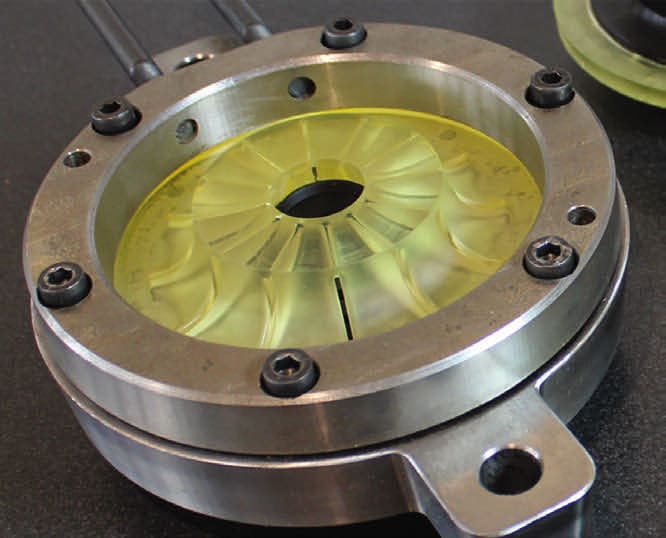
In the manufacturing of PEEK parts, process parameters need to be tightly controlled to achieve target performance, and Liebherr worked with Aitiip to develop and verify a manufacturing process that would meet the following requirements:
High-speed manufacturing process that will lead to 30 percent cost reductions
Recyclable materials
Light-weighting – with a goal of reaching a 40 percent weight reduction
One-shot manufacturing
The collaboration was carried out within the framework of the INN-PAEK project, which was funded by the Clean Sky 2 Joint Undertaking under the European Union’s Horizon 2020 research and innovation program under grant agreement Nº 101007865. According to the European Commission, the INN-PAEK project ran from January 2021 to June 2023 and had a goal of producing a flange wheel based on a family of thermoplastics called polyaryletherketone (PAEK).
Integration of Additive Manufacturing and Injection Molding
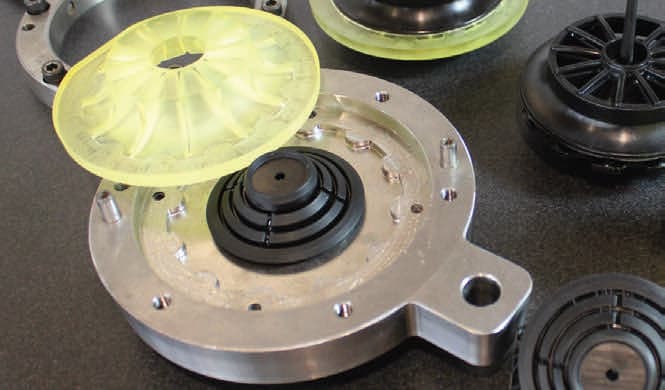
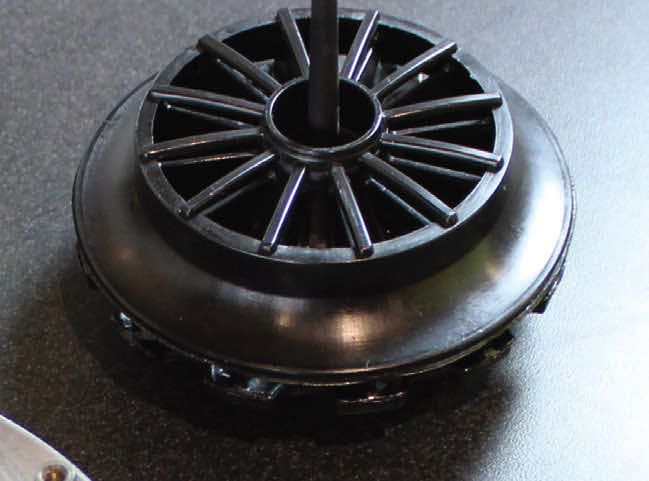
The part to be manufactured was a complex flange wheel with a challenging load case. To achieve the required part performance and manufacturing speed, injection molding was chosen as the manufacturing method. However, the complexity of the flange wheel would be impossible to achieve with conventional metal tooling.
In order to meet Liebherr requirements, Aitiip decided to fully exploit the capabilities of the NXE 400 system in a highly innovative approach. Using the NexaX Pro software, Aitiip created a unique printer profile to enable the printing of parts with superior surface quality. The impeller body inner geometry was realized with a single soluble 3D-printed FIM insert in the Nexa3D xMOLD printed tooling resin. One particular part feature was realized with an insert printed in the Nexa3D xPEEK material that was mounted in the soluble insert before injection to enable its full integration into the injection-molded impeller part. The 3D-printed FIM insert, with the xPEEK feature, was mounted in a mold cavity. Subsequently, the carbon reinforced PEEK material was injected to fill the cavity, and the 3D-printed FIM insert was dissolved to release the final PEEK part.
Freeform Injection Molding, combined with high-performance xPEEK inserts, enabled Aitiip to manufacture a high-performance recycled injection-molded metal replacement part. Furthermore, Aitiip could verify the performance of the part before investments in metal tooling elements had to be made.
Early Verification, Cost Savings and Seamless Scalability
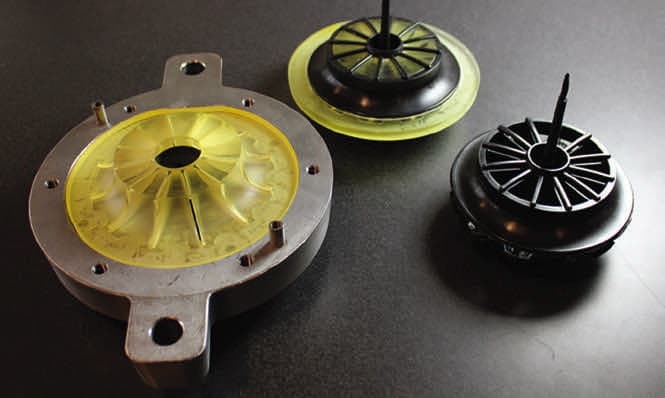
The use of 3D-printed xMOLD resin tooling enabled Aitiip to manufacture a number of test parts and to use these parts to verify key design and performance aspects. FIM has allowed Aitiip weekly iterations, in consequence reducing the project time frame, reaching better and more advanced results in comparison to traditional mold-making processes. Also, the research cost has been drastically reduced, making more efficient the use of resources (time, cost, material, and most importantly, human resources) while increasing freedom of design.
The first iterations were carried out in smaller 3D-printed molds to ensure the shortest possible iterations at the lowest possible costs. Once the part design had been validated and part performance had been verified, Aitiip proceeded to implement a metal cavity to reduce unit costs while still using a 3D-printed xMOLD core and an xPEEK insert to avoid costly investments in complex slider functionality. The resulting mold concept meets customer requirements at the lowest achievable costs of ownership.
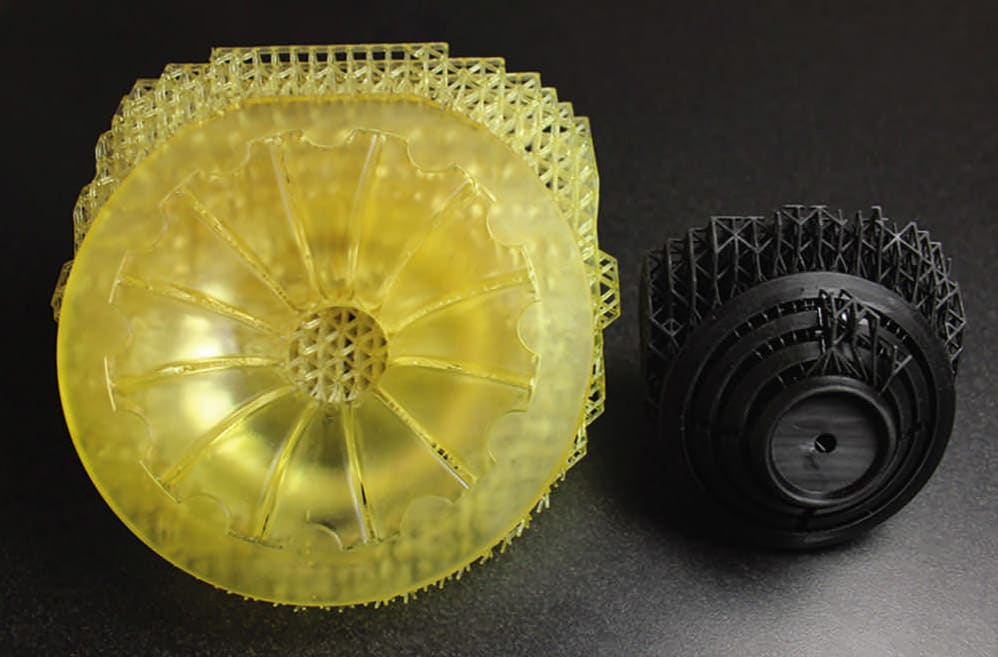
The ability to rapidly and cost-effectively test out a number of tool concepts was a key element in the project’s ultimate success. The complex design of the part, combined with the complex processing of the carbon-filled PEEK, and with the added challenge of integrating a 3D-printed xPEEK insert in an injection-molded part, would have made this project very hard and costly to realize with conventional metal tooling, due to the substantial investments involved.
Aerospace parts manufacturers are met with rigorous part quality requirements, and lighter weight is always an objective. In addition, manufacturers seek ways to increase the implementation of recycled materials.
Liebherr wanted to explore a lighter-weight alternative to the metal used in manufacturing a high-performance flange wheel and collaborated with Aitiip to develop and verify a part design and manufacturing process that would enable Liebherr to migrate from metal to recycled polymer.
In successfully completing this project, Aitiip provided Liebherr with the following key output:
A verified protocol for the manufacturing of a specific challenging spare part, which allows Liebherr to reduce costs, lead times, and supply chain vulnerabilities.
A reference study demonstrating the performance achievable with novel 3D-printed injection mold tooling concepts and novel 3D-printer resins.
A reference model for high mix / low volume product development, scale-up, and after-market servicing based on an on-demand manufacturing platform as an alternative to on-stock supply chain paradigms.
This article was written by Lasse Staal, Director of Business, Freeform Injection Molding, Nexa3D (Ventura, CA). For more information, visit here .
Top Stories
INSIDERManufacturing & Prototyping
![]() How Airbus is Using w-DED to 3D Print Larger Titanium Airplane Parts
How Airbus is Using w-DED to 3D Print Larger Titanium Airplane Parts
INSIDERManned Systems
![]() FAA to Replace Aging Network of Ground-Based Radars
FAA to Replace Aging Network of Ground-Based Radars
NewsTransportation
![]() CES 2026: Bosch is Ready to Bring AI to Your (Likely ICE-powered) Vehicle
CES 2026: Bosch is Ready to Bring AI to Your (Likely ICE-powered) Vehicle
NewsSoftware
![]() Accelerating Down the Road to Autonomy
Accelerating Down the Road to Autonomy
EditorialDesign
![]() DarkSky One Wants to Make the World a Darker Place
DarkSky One Wants to Make the World a Darker Place
INSIDERMaterials
![]() Can This Self-Healing Composite Make Airplane and Spacecraft Components Last...
Can This Self-Healing Composite Make Airplane and Spacecraft Components Last...
Webcasts
Defense
![]() How Sift's Unified Observability Platform Accelerates Drone Innovation
How Sift's Unified Observability Platform Accelerates Drone Innovation
Automotive
![]() E/E Architecture Redefined: Building Smarter, Safer, and Scalable...
E/E Architecture Redefined: Building Smarter, Safer, and Scalable...
Power
![]() Hydrogen Engines Are Heating Up for Heavy Duty
Hydrogen Engines Are Heating Up for Heavy Duty
Electronics & Computers
![]() Advantages of Smart Power Distribution Unit Design for Automotive...
Advantages of Smart Power Distribution Unit Design for Automotive...
Unmanned Systems
![]() Quiet, Please: NVH Improvement Opportunities in the Early Design...
Quiet, Please: NVH Improvement Opportunities in the Early Design...
